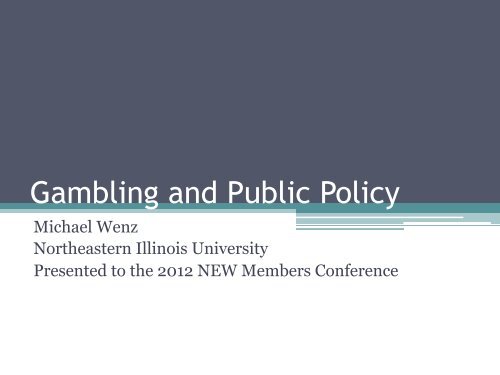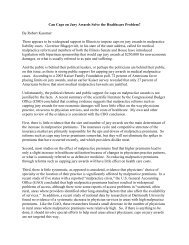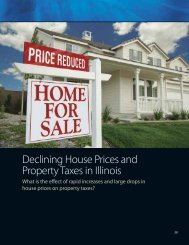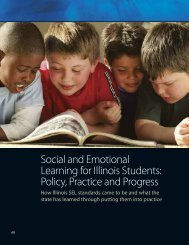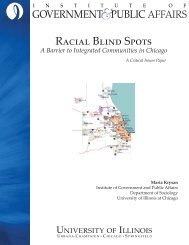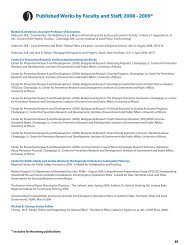the powerpoint slides (PDF). - Institute of Government & Public Affairs
the powerpoint slides (PDF). - Institute of Government & Public Affairs
the powerpoint slides (PDF). - Institute of Government & Public Affairs
Create successful ePaper yourself
Turn your PDF publications into a flip-book with our unique Google optimized e-Paper software.
Gambling and <strong>Public</strong> PolicyMichael WenzNor<strong>the</strong>astern Illinois UniversityPresented to <strong>the</strong> 2012 NEW Members Conference
Outline• Gambling Trends• Gambling Policy Issues▫ Economic Development▫ Social Issues▫ Tax Revenues• Recommendations
Gambling Trends• 22 states have commercialcasinos or racinos:• Commercial casinos in15 states.• Racetrack casinos in 13states• Native American casinosexist in 29 states.• Lotteries exist in 48 states.Source: American Gaming Association State <strong>of</strong> <strong>the</strong> States 2012
Gambling Trends4035302520151050U. S. Casino Spending ($Billions)Avg. Annual GrowthRate: 7.1% per year
Gambling Trends2.521.510.50Illinois Casino Spending($Billions)Avg. Annual GrowthRate, 1994-2011:2.5% per year2012: est. 1.7 billion
Gambling Trends• Wave <strong>of</strong> Casino Expansion from 1991-1996• 1996-2008: Some expansion <strong>of</strong> casino sizes, movetoward racinos▫ Significant expansion <strong>of</strong> online gaming in this period.• 2008: Renewed interest in casino expansion▫ Ohio, Maryland, Pennsylvania• Video Lottery Terminals increasingly prevalent.
Gambling Policy Issues• Economic Development: Do casinos…▫ …create jobs?▫ …increase incomes?▫ …improve neighborhoods?
Economic Development:Do Casinos Create Jobs?Source: Hollywood Casino Joliet• In Illinois in 2011, casinos employed 7,911 workersand paid $313 million in wages, tips and benefits.
Economic Development:Do Casinos Create Jobs?• Do casino jobs displace o<strong>the</strong>r jobs?▫ Casinos have usually been found to create jobs 1,2 .▫ Effect is larger in less densely populated areas 1,3 .▫ Effect is generally larger with tribal casinos.▫ Effect is larger with destination casino markets 4 .
Economic Development:Do Casinos Increase Incomes?• Personal Incomes▫ Casino jobs tend to pay well.▫ Native American casinos increase earnings 2 .▫ Mixed evidence for commercial casinos 5,6 Perhaps a short-run effect?
Economic Development:Do Casinos Improve Neighborhoods?• Property Values▫ Increase around tribal casinos.▫ Mixed results around commercial casinos Relatively more positive effect in more rural areas 3 .
Gambling Policy Issues• Social Issues: Do casinos…▫ …increase <strong>the</strong> incidence <strong>of</strong> problem gambling?▫ …increase crime?
Social Issues:Do Casinos Increase Problem Gambling?• Incidence <strong>of</strong> Pathological Gambling▫ Pathological and Problem Gambling affects0.5-7% <strong>of</strong> <strong>the</strong> adult population 7,8,9 .▫ Pathological Gambling increases near casinos. Probably less than 2 percentage-point increase 9 .• Incidence <strong>of</strong> Bankruptcies▫ Probably increases surrounding casinoopenings 2,10,11 .
Social Issues:Do Casinos Increase Crime?• Crime increases in casino neighborhoods 12,13 .▫ Disagreement about appropriate measure <strong>of</strong>“crime rate” to be used 14 .▫ Opportunists vs. Addicts: Are crime spikes due tocasino traffic or problem gambling?
Gambling Policy Issues• Tax Revenues▫ How much do casinos increase tax revenues?▫ Are casino taxes regressive?
Tax Revenues:Gambling Tax Revenue By StateSTATE Casino Revenues Tax Revenues Average Tax Rate Rhode Island $513 $309 60.2% Maryland $156 $90 57.5% Maine $59 $29 48.9% Pennsylvania $3,020 $1,456 48.2% New York $1,260 $593 47.1% West Virginia $959 $406 42.4% Delaware $552 $230 41.7% Florida $382 $144 37.6% Illinois $1,480 $489 33.1% Indiana $2,720 $846 31.1% Kansas $48 $13 27.0% Missouri $1,810 $485 26.8% New Mexico $249 $65 26.0% Louisiana $2,370 $573 24.2% Iowa $1,420 $322 22.6% Michigan $1,420 $321 22.6% Oklahoma $106 $18 17.2% South Dakota $101 $16 16.2% Colorado $750 $102 13.6% Mississippi $2,240 $274 12.3% New Jersey $3,320 $278 8.4% Nevada $10,700 $865 8.1% • States with racinoshave high tax rates.• States with destinationcasino markets have lowtax rates.Source: AGA State <strong>of</strong> <strong>the</strong> States
Tax Revenues:Gambling Tax Revenue By StateSTATE Casino Revenues Tax Revenues Average Tax Rate Pennsylvania $3,020 $1,456 48.2% Nevada $10,700 $865 8.1% Indiana $2,720 $846 31.1% New York $1,260 $593 47.1% Louisiana $2,370 $573 24.2% Illinois $1,480 $489 33.1% Missouri $1,810 $485 26.8% West Virginia $959 $406 42.4% Iowa $1,420 $322 22.6% Michigan $1,420 $321 22.6% Rhode Island $513 $309 60.2% New Jersey $3,320 $278 8.4% Mississippi $2,240 $274 12.3% Delaware $552 $230 41.7% Florida $382 $144 37.6% Colorado $750 $102 13.6% Maryland $156 $90 57.5% New Mexico $249 $65 26.0% Maine $59 $29 48.9% Oklahoma $106 $18 17.2% South Dakota $101 $16 16.2% Kansas $48 $13 27.0% • 2011 Casino Revenues, allfigures in millions.• Illinois ranks 6 th in casinotax revenue• Pennsylvania ranks 1 st .• Casinos since 2007Source: AGA State <strong>of</strong> <strong>the</strong> States
Tax Revenue:Illinois Tax Revenue by CasinoCasino AGR State+Local Tax Des Plaines $352,226 $151,757 Elgin $179,146 $60,422 Joliet -‐ Harrah's $177,900 $60,248 Aurora $127,758 $38,252 Joliet-‐Hollywood $118,759 $34,799 E. St. Louis $110,738 $33,144 East Peoria $98,005 $26,785 Metropolis $83,370 $20,952 Rock Island $74,506 $18,330 Alton $59,813 $14,298 • 2012 YTD Casino AGR.All figures in thousands.• Casinos in mostpopulated areas generatemost tax revenues.• Graduated tax rateSource: Illinois Gaming Board OctoberMonthly Report
Tax Revenue:Do Casinos Increase Tax Revenues?• Commercial casinos are found to consistentlyincrease government revenue 4 .▫ Casinos are highly taxed, relative to activities thatmight be displaced.▫ Evidence <strong>of</strong> displacement is not very strong 4 .
Tax Revenue:Do Casinos Increase Tax Revenues?• Casinos may be reachinga point <strong>of</strong> saturation insome places.▫ But still good potentiallocations in Illinois.▫ Declining ability to pullin out-<strong>of</strong>-state patrons.▫ Casinos probablycannibalize race tracks 4 .
Tax Revenue:Are Casino Taxes Regressive?• Very little evidence in ei<strong>the</strong>r direction.• Much evidence that o<strong>the</strong>r forms <strong>of</strong> gambling areregressive.▫ Especially lotteries, probably EGDs/VLTs 15 .
Electronic Gaming Devices• What about VLTs or slot machines in bars?▫ Reliable source <strong>of</strong> government revenue 4 .▫ Don’t create jobs.▫ Don’t attract tourist dollars.▫ More likely to cannibalize o<strong>the</strong>r local businesses.▫ Regressive.▫ Increased rates <strong>of</strong> pathological gambling.
Recommendations• Important to distinguish between “whe<strong>the</strong>r” and“how” to expand casino gambling.SEIG Report:“Judging <strong>the</strong> overall positive or negative nature <strong>of</strong>gambling will always be a subjective determinationabout <strong>the</strong> relative importance <strong>of</strong> <strong>the</strong> observed socialimpacts compared to <strong>the</strong> observed economic impacts.”
RecommendationsIf so, how?• Key questions:▫ What are <strong>the</strong> objectives?▫ Where?▫ What type?
Recommendations• Objectives:▫ Economic Development or Redevelopment: Locate away from areas with high urban density. Locate in areas with unemployed resources. Larger casinos have larger impacts.
Recommendations• Objective:▫ Maximize Tax Revenue Locate in high-density areas. Spread out <strong>the</strong> casinos to avoid cannibalization. Consider racinos.
References• 1. Cotti, Chad. "The Effect <strong>of</strong> Casinos on Local Labor Markets." Journal <strong>of</strong> Gambling Business and Economics 2, no. 2 (2008): 17-41.• 2. Evans, William N, and Julie H Topoleski. "The Social and Economic Impact <strong>of</strong> Native American Casinos." NBER Working Paper 9198,2002.• 3. Wenz, Michael G. "The Impact <strong>of</strong> Casino Gambling on Housing Markets." Journal <strong>of</strong> Gambling Business and Economics 1, no. 2(2007): 101-120.• 4. Williams, Robert J., Jurgen Rehm, and Rhys M.G. Stevens. "The Social and Economic Impacts <strong>of</strong> Gambling. Final Report Prepared for<strong>the</strong> Canadian Consortium for Gambling Research." 2011.• 5. Walker, Douglas M, and John Jackson. "Do Casinos Cause Economic Growth?" American Journal <strong>of</strong> Economics and Sociology 66, no.3 (2007): 593-607.• 6. Walker, Douglas M, and John Jackson. "New Goods and Economic Growth: Evidence From Legalized Gambling." Review <strong>of</strong> RegionalStudies 28, no. 2 (1998): 47-69.• 7. Thompson, William N, Ricardo Gazel, and Dan S Rickman. "The Social Costs <strong>of</strong> Gambling in Wisconsin." (Wisconsin Policy Research<strong>Institute</strong>) 9, no. 6 (July 1996).• 8. National Opinion Research Center. Gambling Impact and Behavior Study: Report to <strong>the</strong> National Gambling Impact StudyCommission. Chicago: University <strong>of</strong> Chicago, 1999.• 9. National Gambling Impact Study Commission. "Final Report." Washington, D.C., 1999.• 10. Barron, J M, M E Staten, and S M Wilshusen. "The impact <strong>of</strong> casino gambling on personal bankruptcy filing rates." ContemporaryEconomic Policy 20, no. 4 (2002): 440-455.• 11. Goss, E, E Morse, and J Deskins. "Have casinos contributed to rising bankruptcy rates?" International Advances in EconomicResearch 15, no. 4 (2009): 456-469.• 12. Buck, Andrew J, Joseph Deutsch, Simon Hakim, Uriel Spiegel, and J. Weinblatt. "A Von Thunen Model <strong>of</strong> Crime, Casinos andProperty Values in New Jersey." Urban Studies 28, no. 5 (1991): 673-686.• 13. Grinols, Earl L, and David B Mustard. "Casinos, Crime and Community Costs." Review <strong>of</strong> Economics and Statistics 88, no. 1 (2006):28-48.• 14. Walker, Douglas M. "Do casinos really cause crime?" Econ Journal Watch 5, no. 1 (2008): 4-20.• 15. Ghent, Linda S, and Alan P Grant. "The Demand for Lottery Products and <strong>the</strong>ir Distributional Consequences." National Tax Journal63, no. 2 (2010): 253-268.


